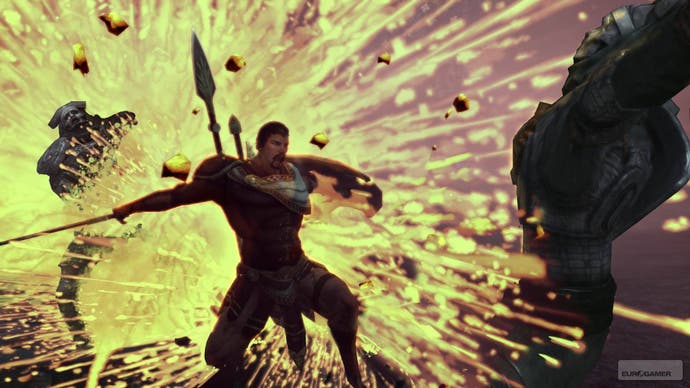Rise of the Argonauts
Greeks bearing gifts.
That "lethality" sandal doesn't quite fit the other foot though, because thankfully Jason can't be killed by a single blow. If you're caught with a critical hit or stamped on by a giant then you'll enter a "state of grace", where everything slows down and the edges of your screen turn red. Sometimes you bend double and start dripping blood. If you die, the automatic checkpoints stop you falling back too far. If you manage to run away then you'll recover. "It's not a punishing action game, it's a rewarding action game," says Price hopefully. An action game somewhere on the Ancient Greek scale between God of War and Titan Quest.
Jason also has various abilities to develop thanks to his ties to the old-gods-network of Ares, Hermes, Athena and Apollo. You're constantly favouring them with your violent acts - warry old Ares likes it when you use the mace, for example - and charming conversation, and this drives you along their skill trees. Powers are mapped to your d-pad and can be as extravagant as a void that sucks up nearby enemies a lightning bolt from the heavens to accompany your spear. Originally there was a "Miracle and Torment system" where a god randomly chipped in and helped out, but this has been scrapped in favour of the d-pad powers. There are around 25 in total and you should uncover the best part of two "god trees" on an average play-through, Price reckons.
There's also loot, obviously, and we saw several different types of equipment for each of Jason's slots: body, spear, sword and mace. But generally these pieces are much scarcer and as a result meaningful, in terms of the story behind them, than in other RPG affairs. Interestingly, the only piece that doesn't change is your shield, which Price calls your "Indiana Jones hat". It's the symbol of you as king, and will crop up all over the place - and on graffiti slagging you off in some cases. Another symbol is the famous Argo ship with its giant clockwork engine, which acts as something of a hub: Icarus' father Deadalus brings his entire blacksmith workshop on board, there's an armoury to store your equipment and a shrine where you offer your deeds to the gods, and it's also here that you pick your two Argonaut companions for each island.

So it is taking the odd liberty, but it's obvious that Argonauts is doing it with purpose and affection. Take the progress screen, for instance. It's a star chart where your deeds fill in classical Greek constellations as you earn them, and you can even super-power particularly special weapons after you complete related constellations, giving you a fiery mace or something equally flashy. And what a fire effect! The Unreal Engine 3 isn't always put to brilliant use here (models and environments are technically basic, despite the DX10 features of the PC build), but the art direction, and each island's painstaking research and special effects, carry it all marvellously. The only things we'd stick a question-mark next to are the voice-acting and cut-scenes, but we're promised these will be tightened up by the autumn.
Where Rise of the Argonauts has already succeeded though is in sticking to its design brief: going back to the roots of role-playing games and making tough decisions. "I think it's more that the concept of what people are looking for is changing," Price explains when we put it like that. Either way, the outcome is a strong, customisable character with choices to make in a game that's making Ancient Greece look rather cool again.
Rise of the Argonauts is due out on PC, PS3 and Xbox 360 this autumn.

